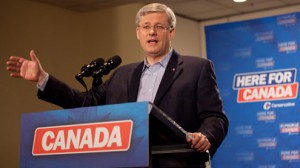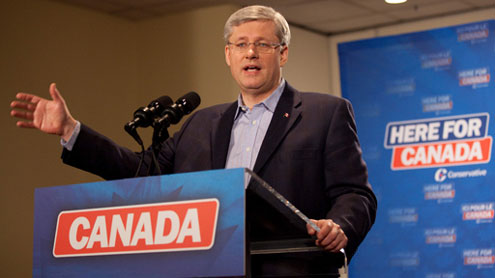 THUNDER BAY – Liberal leader Michael Ignatieff is set to visit Thunder Bay on Monday. The news comes as the latest poll is showing that the Liberals have fallen to third place in the national standings. A new Ipsos Reid poll on Canada’s Federal Election has captured the collapse of the Bloc vote in Quebec that has catapulted Jack Layton’s NDP into first place there and second place nationally as the Liberals sink to third place. What this suggests is that with this new political landscape, Stephen Harper’s Conservatives may well be headed for a solid majority government while the Ignatieff Liberals may not yet have hit bottom with just over a week to go.
THUNDER BAY – Liberal leader Michael Ignatieff is set to visit Thunder Bay on Monday. The news comes as the latest poll is showing that the Liberals have fallen to third place in the national standings. A new Ipsos Reid poll on Canada’s Federal Election has captured the collapse of the Bloc vote in Quebec that has catapulted Jack Layton’s NDP into first place there and second place nationally as the Liberals sink to third place. What this suggests is that with this new political landscape, Stephen Harper’s Conservatives may well be headed for a solid majority government while the Ignatieff Liberals may not yet have hit bottom with just over a week to go.
If the election were held tomorrow, the Conservatives would receive 43% of the vote among decided voters, up 2 points from two weeks ago. Further, 45% believe that ‘the Conservative Party under Stephen Harper has done a good job and deserves re-election’, which, if translated into votes, would likely secure a majority government. Conversely, 49% more closely believe that the Tories ‘do not deserve to be re-elected and it’s time for another party to be given a chance to govern the country’. One in ten (6%) don’t know.

Overall, Jack Layton and his NDP are flying high and now find themselves ahead of the Liberals nationally, on the heels of two solid performances at the televised leaders’ debates, an affable and trusting nature, and policies that are resonating with many Canadians, especially on healthcare. Jack Layton and the NDP would receive 24% support, up 5 points from two weeks ago. This represents the first time in 19 years that the NDP has been in second place, and the first time in 20 years that they’ve been ahead of the Liberals in the polls.
Things are looking increasingly dire for Michael Ignatieff and his Liberal Party, who have the support of only 21% of decided voters, down 5 points in two weeks. This is put in context by an Ipsos poll released yesterday which revealed, despite the Liberal leader’s assertions that his party is the best and only party to lead on healthcare, Canadians least trust the Liberals and most trust the NDP on that file. The Green Party, led by Elizabeth May, has 4% of the vote.
Support for Gilles Duceppe and the Bloc Quebecois has collapsed in Quebec, and they no longer hold on to the wide lead they held in the province just weeks ago. They have dropped to 6% nationally, down 3 points, and appear to have lost their stranglehold on the province for the moment.
One in ten Canadians (8%) do not know who they will vote for on Election Day.
A closer look at the regions reveals that:
In Quebec, a four-way race is developing making it the most competitive province in the country, with many seats up for grabs for all the parties. The NDP (28%) leads narrowly over the Bloc Quebecois (27%), with the Conservatives (24%) and Liberals (20%) closely behind. Support for the Green Party has eroded (0% — rounded down).
In Ontario, the Conservatives (41%) maintain a comfortable lead over the Liberals (27%), who are being challenged by the NDP (22%) who are not very far behind. The Green Party sits at 6% support.
In British Columbia, the Conservatives (46%) still have a healthy lead over the surging NDP (32%), but the Liberals (12%) are struggling to maintain levels of support higher than that of the Green Party (9%).
Recent election events may have begun to capture the interest of more Canadians as 63% now say they are absolutely certain to vote, up 7 points from Ipsos’ last horserace poll two weeks ago. Among those who say they’re very likely to vote, Conservative support softens slightly to 42% (-1), NDP support strengthens slightly to 25% (+1), the Liberal vote remains unchanged (21%) and Bloc support strengthens to 7% (+1). Support for the Green Party (4%) is also unchanged when examining the vote among those absolutely certain to vote.
Conservative Party support is still the most robust, with 92% of current Tory supporters saying that they are ‘certain’ (67% absolutely/24% fairly) that this is the party they’ll vote for on Election Day. By comparison, nine in ten (89%) NDP voters say the same (49% absolutely/40% fairly), 87% of Bloc voters (56% absolutely/30% fairly), 86% of Liberal voters (45% absolutely/41% fairly), and 85% of those voting for some other party including the Greens (44% absolutely/41% fairly), are certain that this is the Party they will end up supporting on Election Day. The only figure that has changed substantially since two weeks ago is the commitment of Bloc voters with 87% (up 12 points) of supporters saying this is the party they will vote for on Election day (67% absolutely/24% fairly). This suggests that, with the erosion of Bloc votes in the past two weeks, they are getting closer to their figure of core supporters, at which time it will be difficult to dip further in the polls.
Canadians Split on Whether They Prefer Harper Majority or Coalition…
Stephen Harper’s campaign for a majority has been more vocal in recent days, saying that if he doesn’t win a majority government, the opposition will certainly try to take over running the country by means of a coalition. But Canadians are dead split on whether they would prefer a coalition of the Liberals and NDP or a majority government.
Nearly half (46%) would prefer to see ‘Stephen Harper and the Conservatives winning a majority government’. If a Harper majority is defined as the ballot-box issue for Canadians, and this proportion of Canadians shows up to vote for a Harper majority, they would certainly earn one with this proportion of the popular vote. The other half (46%) of Canadians, though, would prefer ‘the Liberals and the NDP forming a coalition to take over from Stephen Harper and the Conservatives.
But the story changes, slightly, when the Bloc Quebecois is thrown into the mix. More Canadians would rather see ‘Stephen Harper and the Conservatives winning a majority government’ (48%) than ‘the Liberals, NDP and Bloc forming a coalition to take over from Stephen Harper and the Conservatives’ (41%). One in ten (11%) are undecided.
Trust is Key…
At the start of the campaign, trust was put forward as a key issue in this campaign, whether it was in the context of who Canadians trusted to lead on the economy or healthcare, or who they trusted to respect Canada’s democracy and institutions, or who they trusted to provide open and accountable government. Up to this point in time, on the overall metric of trust Stephen Harper has held the lead. But the results of this poll show that when it comes to choosing one of the major party leaders who is best described as “someone they can trust”, four in ten (40%, up 7 points from two weeks ago) choose Jack Layton, placing him ahead of Stephen Harper (35%, up 1 point). Just 9% believe Michael Ignatieff is best described by this trait (down 3 points), while 6% (23% of Quebecers) say it’s Gilles Duceppe (down 1 point). One in ten (11%) doesn’t know who they most trust (down 4 points).
With these numbers, it’s no surprise that nearly half (45%) of Canadians overall – and 66% of NDP supporters – see Jack Layton and the NDP has having the campaign which is gaining the most popularity and momentum. Three in ten (28%) believe that distinction falls to Stephen Harper and the Conservative Party (51% of Tories), while just 11% think Michael Ignatieff and the Liberals are flying high (just 23% of Liberals). In Quebec, two in ten (19%) think that Gilles Duceppe and the Bloc are gaining the most momentum, compared to 54% who think it’s Jack Layton and the NDP.
Second Choice…
Examining one’s second-choice vote can give some insight into which parties have an opportunity to pick up other parties’ voters, and also a sense of how strategic voting might play out when some Canadians head into the ballot box.
Tory supporters are more likely to name the NDP (32%) as their second-choice over the Liberals (24%). One in ten (10%) would choose the Green Party, while just 2% would switch the Bloc.
One half (49%) of current Liberal voters say their second choice is the NDP, which poses a significant challenge for Michael Ignatieff to stop the bleeding and a great opportunity for Jack Layton to continue his surge. One quarter (23%) of Liberals would opt for the Tories second, while 7% would go Green and 6% would go Bloc.
While half (49%) of Grit supporters choose the NDP second, only four in ten (41%) NDP supporters would choose the Liberals second. Two in ten (18%) would choose the Conservative, and the Greens (17%), while 12% would choose the Bloc, further re-iterating that the surge in Quebec is largely a function of former Bloc supporters parking their vote with the increasingly popular Jack Layton.
One half (48%) of Bloc voters would choose the NDP as their second choice, while three in ten (27%) would opt to vote for the Liberals second. The Conservative (8%) and Green Party (6%) lag as second-choice options.

